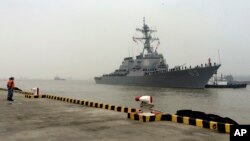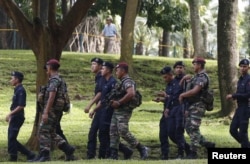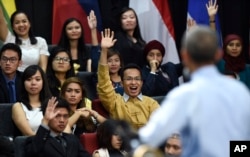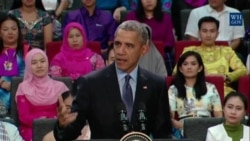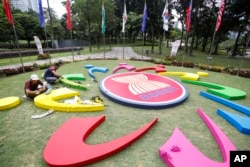White House officials said establishing a "rule-based order" in the disputed South China Sea region will be high on U.S. President Barack Obama’s agenda as he meets with regional leaders during the annual meeting of the Association of Southeast Asian Nations (ASEAN) and the adjoining East Asia Summit.
Obama arrived Friday in Kuala Lumpur, Malaysia where the summit will be held Saturday and Sunday.
The White House has repeatedly said establishing a “rule-based order” is critical to regional security and economic prosperity, both cornerstones of the U.S. rebalance to the Asia-Pacific region.
Asia policy adviser Dan Kritenbrink said while the United States does not take a position on the maritime territorial disputes, “We do have a national interest in ensuring freedom of navigation, unimpeded lawful commerce, peaceful resolution of disputes, including the use of the international arbitration under the U.N. Convention on the Law of the Sea.”
Kritenbrink spoke during the Asia-Pacific Economic Cooperation (APEC) summit in Manila, where Obama addressed the issue during talks with several other leaders attending the gathering.
Lower regional tensions
While in Manila, Obama called on China to lower tensions in the region by “pledging to halt further reclamation, new construction, and militarization of disputed areas in the South China Sea.”
Beijing has been conducting dredging projects on seven disputed formations for nearly two years, creating artificial mini islands.
Two of those newly formed islands have airstrips and harbors that can handle military air and sea craft.
Surrounding countries are suspicious of Beijing’s intentions.
China has said it has “indisputable sovereignty” over practically the whole sea and that there is no need for outsiders to weigh in on the disputes.
“When we see instances of powers that behave in ways that contravene those international rules and norms, we expect our friends and partners and allies in the region to stand with us and to call out that behavior,” Kritenbrink said.
Deputy National Security Advisor Ben Rhodes said the ASEAN gathering involves nations that surround the disputed area and provides the right forum for such talks.
“We believe the East Asia Summit should be a forum for addressing political and security issues as well as economic issues,” Rhodes said.
WATCH: US President urges Southeast Asian youth to reject violent extremism
After landing in the Malaysian capital, Obama held a town hall meeting where he called on young Southeast Asian leaders to reject extremism and embrace tolerance.
Town hall
During a question and answer session, Obama also said he would "definitely" raise the issue of human rights and corruption when he meets later Friday with Malaysian Prime Minister Najib Razak.
After that meeting, the U.S. leader said the two had “constructive” talks about the importance of civil society and “how we can promote those values that will encourage continued development and opportunity and prosperity.”
Speaking with Obama to reporters, Najib said his government would take into account the views and concerns expressed by Obama and added “Malaysia is committed to reforms, and we are committed to reassuring at the same time there’s peace and stability.”
In recent years, a rising number of opposition figures and government critics have been arrested on a wide array of anti-state charges.
Former Deputy Prime Minister Anwar Ibrahim is serving a five-year prison sentence after being convicted on sodomy charges his supporters say were politically motivated.
Najib has also been pressured by his opponents to resign following reports he received $700 million into his personal accounts from the government-owned investment fund.
Security has been expanded throughout Kuala Lumpur amid reports of a terror threat by the Islamic State group, which carried out deadly attacks last week in Paris.
Army personnel
Malaysia's police chief, Khalid Abu Bakar said Friday the reports were unconfirmed, but officials stressed thousands of army personnel are stationed or put on standby in response.
Most of those in attendance at the ASEAN summit are coming from the Philippines, where they attended an annual meeting of the Asia-Pacific Economic Cooperation – APEC.
Both gatherings, which typically focus on economic issues, have been partly overshadowed by global efforts to combat terrorism following the deadly Paris attacks that killed 129 people.
William Gallo contributed some material to this report from Washington.




